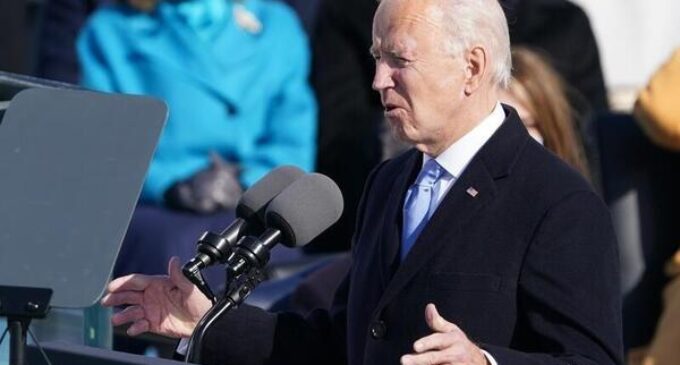Debunking Biden’s foreign policy ‘reset’

BY NIZAR K. VISRAM
DURING his first week in office, US President Joe Biden signed at least 44 executive actions, orders, proclamations and memorandums. He rejoined the World Health Organization (WHO) and the Paris climate agreement and repealed the Trump administration’s ban on travellers from Muslim-majority and African countries, including Libya, Somalia, Eritrea, Nigeria, Sudan and Tanzania.
Biden extended relief on federal student loan payments and directed immediate action to deliver economic relief to working families bearing the brunt of the pandemic. He hopes to see pass through Congress the $1.9 trillion relief plan, including $1,400 stimulus checks and the minimum wage of $15 per hour.
Biden administration also pledged a great “radical reset” in foreign relations, a total break from Trump’s megalomaniac mindset and style of international relationship, such as “America first” and “make America great again”.
The question is whether Biden will be able to chart a fundamentally new course and eradicate Trumpism at home and abroad. During his four-year rule, Trump left his trademark drive towards trade wars, unilateralism, racism, nationalism and misogynism. Biden might be able to overcome some of these attributes of Trumpism, but the world expects him to go beyond the traits of his predecessors.
For Trumpism is a product and reflection of the profound crisis of the US empire that Biden has inherited. It would thus be delusive to imagine that once is in the Oval Office, he will reinvent himself, hit a reset button, and pursue a different foreign policy.
After all, it is the same Joe Biden who supported the US wars of aggression in Grenada and Panama in the 1980s, in the Balkans in the 1990s, and in Afghanistan and Iraq in the 2000s. He opposed the 1991 Gulf war but later regretted it. He supported the disastrous 2003 Gulf War but later held back support. He firmly supported Obama’s bombing of Iraq and Syria in August 2014. That was Biden as senator and Biden as Obama’s Vice President.
And so it is least surprising that he picked as his secretary of state Tony Blinken who, in 2017, co-founded WestExec Advisors, a secretive political strategy advising firm business consultancy that worked with defense contractors, thus profiting from negotiating contracts between corporations and the Pentagon.
They included Google’s Jigsaw, Israeli artificial-intelligence company Windward, and surveillance drone manufacturer Shield AI, which signed a $7.2 million contract with the Air Force, and “Fortune 100 types”. The artificial intelligence technology for drone targeting was aborted by outraged Google employees.
Blinken received almost $1.2 million in compensation from WestExec.
In the same vein, Biden nominated Victoria Nuland as Under Secretary for Political Affairs, effectively the third-ranking U.S. diplomat. Nuland will be remembered for her ill-famed role in the 2014 coup, bringing neo-fascists to power in Ukraine.
Avril Haines, a former WestExec principal, is to serve as director of national intelligence. As legal adviser to Obama and the State Department, and later as Deputy CIA Director and Deputy National Security Advisor, she provided a legal fig leaf to Obama on the expansion of drone strikes that very often killed civilians and turned weddings into funerals.
Haines also supported the controversial nomination of waterboarding proponent Gina Haspel as director of the CIA under President Trump, notwithstanding the fact that Haspel directly supervised the CIA’s torture program, She also decided not to punish those who hacked into the computers of Senate staffers investigating the CIA’s torture program. Her “accountability board” protected CIA personnel from having to answer for their use of torture, and her team redacted the board reports. Now she is Biden’s national intelligence chief.
“If Haines couldn’t even oppose the appointment of a torturer as CIA director, how can she be expected to rein in American intelligence agencies’ abuses of power?” asked The Guardian (UK) newspaper.
Retired army general Lloyd Austin is Biden’s defence (sic) secretary. He served as commander of United States Central Command (CENTCOM) and was vice chief of staff of the United States Army and the last commanding general of United States Forces in Iraq. Before his appointment, he was head of the Austin Strategy Group, while serving on the boards of Raytheon Technologies, Nucor Steel, Tenet Health Care and United Technologies.
He’s thus a global war veteran, in charge of US wars of aggression in Afghanistan, Syria and Iraq. Now he will be charged with the task of directing US wars of aggression in Washington’s corporate interests. He said: “What our troops achieved in Iraq over the course of nearly nine years is truly remarkable….. they gave the Iraqi people their freedom.”
This is how Secretary Austin describes the invasion of Iraq that was neither in self-defense nor sanctioned by UN Security Council, and thus constituted the crime of war of aggression, according to the International Commission of Jurists (ICJ) in Geneva.
If Biden’s devotion to the “reset” means anything, he should start by restoring pre-2015 rules of engagement to “spare civilian lives”. In 2015 the Obama administration did away with the rules to let U.S. commanders order air strikes that kill up to 10 civilians without prior approval from Washington.
Trump unleashed the rules even further, leading to some 40,000 civilians killed in the assault on Mosul alone. Biden should reset these rules. Better still, he can avoid these tragic civilian deaths altogether by reducing U.S. military spending, end these wars and bring back home U.S. troops from combat zones.
Regarding the Middle East, Biden has promised to reverse the Trump administration’s policies by restoring diplomatic relations with the Palestine Liberation Organisation, and resuming funding for UNWRA. Yet prior to the election Biden declared that he would not move the US embassy in Israel back to Tel Aviv.
Blinken also said that Biden “would not tie military assistance to Israel to things like annexation or other decisions by the Israeli government with which we might disagree.” He then praised Trump’s infamous “peace plan” between Israel and Arab states, and the hopelessly biased “deal of the century.”
Both Biden and Blinken have declared to the Israel lobby that withholding (unconditional) aid would be a “hostile” act against Israel.
Vice-president Kamala Harris confirmed that the “Biden administration will sustain our unbreakable commitment to Israel’s security.” In other words, while the Biden administration is speaking of restoring relations with the Palestinians it is not ready to challenge Israel’s illegal occupation of Palestine or even to pressure it to freeze its settlement expansion.
Biden will also have to deal with Iran, especially after Trump dishonored the Iran nuclear deal (JCPOA), and slapped oppressive sanctions, punishing Iran for its adherence to the UN-endorsed deal.
Trump then brought the country to the brink of war by assassinating Iran’s top general. Biden now has a choice to make: either continue with the failed policies of the Trump administration, or rejoin the JCPOA, lift the sanctions, and unblock the funding that Iran urgently needs to deal with the Covid crisis.
But the Biden administration has already announced that it will not lift sanctions “unless Iran comes back into compliance”. Since it was the U.S. that first violated the deal by pulling out and then imposed sanctions, it is the U.S. that has to come into compliance.
The 159-page deal was reached after 20 months of gruelling and acrimonious negotiations between Iran and the five permanent members of the United Nations Security Council plus Germany, together with the European Union. The negotiators not only read the deal word for word but haggled and argued over every single word, The nuclear deal was then endorsed by the Security Council. Now Biden is telling us it is not good enough.
It is also to be seen if Biden pulls back U.S. sanctions on countries such as Venezuela, Cuba, Nicaragua and Syria. These are a form of economic warfare condemned by UN special rapporteurs as crimes against humanity, as they deprive ordinary citizens of their daily necessities. Biden administration also needs to stop supporting fascist oppositions in Venezuela, Ecuador and Bolivia.
Trump administration imposed an embargo on Cuba, blocking coronavirus aid shipments, restricting remittances to family members and sabotaging Cuba’s medical missions overseas.
The inclusion of Cuba in the U.S. list of countries it considers to be sponsors of terrorism, a unilateral decision by Donald Trump, has been condemned by many countries and organizations throughout the world, including the U.S.
Seattle City Council called upon President Biden to reverse the decision by Trump. It also called for an end to the economic, commercial and financial blockade the U.S. has imposed against Cuba for almost six decades. In fact more than 14 US cities, including San Francisco, Richmond and Berkeley, have expressed their desire to cooperate with Cuba in combating Covid-19,
And in the African continent, if Biden is to apply his “Build Back Better” mantra, he needs to adopt a new policy rather than continuing with the past. US policy in the continent has so far been hovering around what they call the US national and global interests. From the Sahel, Nigeria, and Somalia, to the DRC such policy has fuelled rather than suppressed insurgencies.
Military top brass from the US claim that their leadership is critical, citing the ongoing insurgencies in the African countries, turning deaf ears to the counter-argument that U.S. policies have been ill-conceived and counterproductive, and that US and other foreign military intervention has exacerbated the crises.
In reality, they have been approaching Africa mainly for access to, and control of, its natural resources. The DRC, for example, possesses 80 percent of the world’s supply of Coltan, essential in the production of every kind of electronic device.
Proponents of the US military-industrial complex are under misconceptions that religion and ethnicity are the root causes of African conflicts, rather than structural inequalities, poverty, underdevelopment, and social repression.
Biden administration’s Africa policy will be productive if the U.S. policymakers are willing to learn rather than to preach and dictate. Biden has to shed the notion of American exceptionalism, taking the United States to be a unique force for good in the world. Such an attitude leads to endless wars and mayhem.
His promise to “re-engage with the world” may be a welcome move for some. But the soft-spoken Biden will continue working for the military-industrial complex. One has to remember how the Obama-Biden administration promised a change but then continued with the same trend inherited from the Bush administration i.e. instrumentalisation of foreign aid, and militarisation of foreign policy.
And so counterterrorism operations conducted by the U.S and its allies, including drone and missile strikes, have been killing countless unarmed civilians, leading to increased local support for insurgent forces.
With the establishment of Africa Command (AFRICOM), the US military has been the most visible symbol of U.S. presence in Africa. Currently, the US has over 6,000 troops in military bases across the continent. There are 46 various forms of U.S. bases as well as military-to-military relations with 53 out of the 54 African countries. U.S. Special Forces troops now operate in more than a dozen African countries.
The Obama administration directed extensive drone operations across Africa. Going by the past experience, it wont be different with Biden. The wars, sanctions, subversions, death and destruction will continue. Yet the White House says the US goal is to “bring peace and security to the people of Africa”
Actually, in his campaign trail, Biden pledged that he does not intend to cut the military budget. He said, “I’ve met with a number of my advisors and some have suggested in certain areas the budget is going to have to be increased.”
“We can make America, once again, the leading force for good in the world,” Biden emphasised in his inaugural Address.
With this talk of regaining global leadership, the Biden administration is as committed to the “the indispensable power” of the US as it was when former Secretary of State Madeleine Albright said in 1998: “If we have to use force, it is because we are America.”
Visram is a commentator from Tanzania. He is currently in Ottawa (Canada) and can be reached at [email protected]
Views expressed by contributors are strictly personal and not of TheCable.
















There are no comments at the moment, do you want to add one?
Write a comment